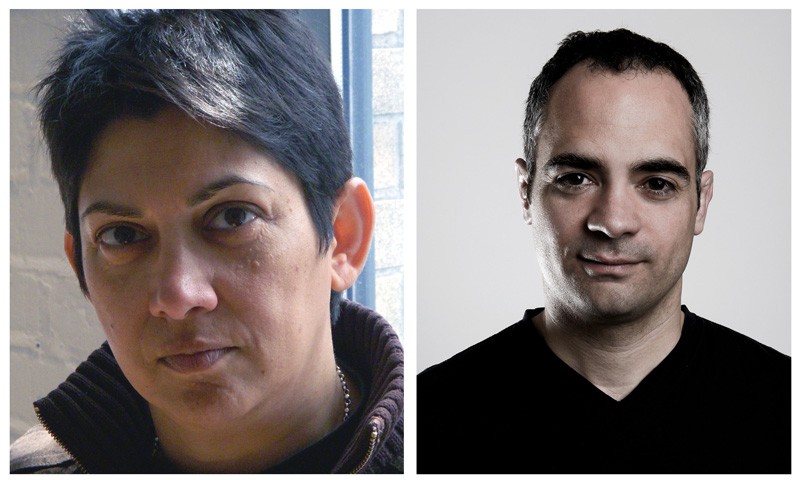
Now in its third year, Briarpatch’s Writing in the Margins contest seeks fresh, creative writing that brings to life issues of political, social, and environmental justice. This year’s contest entries will be judged by award-winning writers Shani Mootoo and Marcello Di Cintio. Briarpatch books columnist Yutaka Dirks caught up with our judges to talk politics and prose.
What sustains you as a writer?
SM: The need to figure out what drives us. Mostly to figure out what makes us love the way we do and hate the way we do. To try and understand why we desire the way we do. As humans, we’re an intelligent life form, but our behaviours toward others, toward those who are different than we are, goes against this idea. There are obvious answers, but I want to work out the nuances – not just to condemn someone who hates another person because of difference, but to try and understand what is not so obvious. I want to unearth what’s not visible, but that cuts deeply still.
MDC: I think what sustains me is curiosity, which might be what Shani is talking about. I’m fascinated by people’s stories. Being a writer is like having a backstage pass into the lives of interesting people. Meeting them and hearing those stories is the engine that runs my work. Part of this, of course, is the travel. I love to travel and am utterly bewildered by those who don’t. But I’ve learned that I don’t need to get on a plane to distant locales to find stories. The stories are all around us. The world is full of characters looking for a writer. I strive to be that writer.
Marcello, you’ve said that you don’t consider Walls to be a political book, and Shani, you’ve stated that you eschew writing that starts with an agenda. Yet both of you have written books that many readers would identify as political works. How do you see the relationship between politics and writing?
MDC: With Walls, I didn’t set out to write a political book. I was writing a travelogue that brought me to some fascinating and tragic places to hear the stories of the people who lived there. I am not interested in politics, at least not in my writing, unless the approach is intimate and personal. I want to write about the people on the ground who are affected by the decisions made by the men (and they are almost always men) who sign documents in an office elsewhere.
SM: I can’t think of a published writer whose work isn’t political, whether they intended it or not. The personal is political, etc. But to begin a book with its conclusion (not of plot but of ideas) already known, to write toward that conclusion, seems to be to lecture, to be didactic. I can say this because there have been pieces that I wrote to an agenda, and they have failed miserably.
Exploration – writing to try and find out – has always worked much better for me. For one thing, I surprise myself, and this makes the process more enjoyable.
The hardest thing to comprehend is that while my political beliefs might seem to me and to people who are like me to be totally sensible and absolutely correct and noble, those who oppose me politically feel as passionately and absolutely about their beliefs. So, where does truth lie? I don’t know. But I always feel that art in its many forms slices through ideology and approaches truth better than any argument, probably because, in the end, art tries to find the heart of the matter rather than the brain of it.
Can you describe your writing practice? How do you begin or prepare for new projects?
MDC: I wish I had a practice that I could trust. Everything I do begins so terribly disorganized, and it’s a shock to me when it turns into something concrete. I guess what I do is follow an idea that interests me and allow myself to get lost along its thread. For example, I am interested in the Palestinian relationship to books and literature right now. I find myself reading a lot of stuff online, ordering books, getting distracted, and following tangents. Eventually, I hope, this will lead to something structural that I can hang a narrative on.
A non-fiction writer is like a sculptor who starts with a huge slab of marble. The sculptor creates his or her art by removing all that is unnecessary, chipping away bit by bit until the sculpture is revealed. But he can’t do anything unless he has that slab to start with. For me, collecting information and following ideas is my way of amassing the raw materials, my slab of marble, that I will eventually chip and chisel into a narrative.
SM: Having just finished a novel, I am wondering just this. Four novels and still I am at a loss. If I have learned anything, it’s that it can’t be forced. At the end of a book, I’m depleted. Everything I see and hear feels like a story waiting to be told, but they all fizzle out before they get on paper. I know the exhaustion is coming to an end when I begin to be nagged by the same bits and pieces, and at some point I take one of those bits and begin to put down exactly what it is that is intriguing me. Usually it isn’t a full-blown story but a tiny image or a feeling, and once it gets momentum, I see reason and method and the possibility of a story. It’s pretty organic. I sort of just let the writing happen, and then at some point quite far along – usually about 100 pages or so – I stop and take stock, and then I begin to be a bit more controlling, moulding, conniving.
What advice would you share with writers who are thinking of entering the Writing in the Margins contest?
SM: Stop thinking about it and do it! Take it seriously enough but make sure to really enjoy the process – even when it’s so hard that you’re tearing out your hair. And then send it in.
DCM: I agree with Shani. Just enter! Be confident enough in your own work and your own voice to want to share it. Entering writing contests was my first step toward what I now do as a career. Don’t take things lightly, though. Write the best story you can. Then rewrite it again a couple more times. Then send us your best stuff.
Read more about the contest and register HERE.




